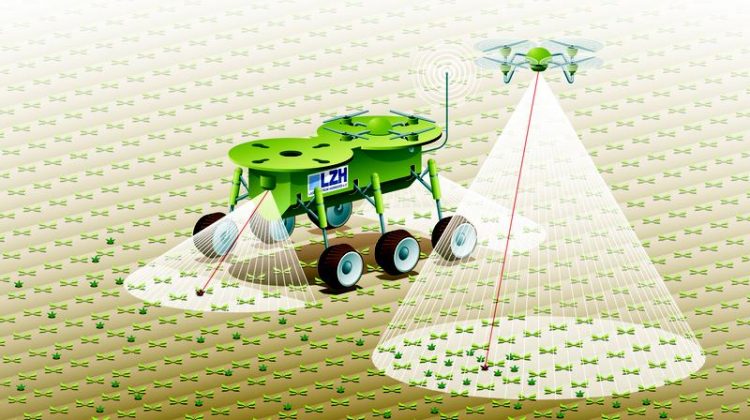Laser versus weeds: LZH shows Farming 4.0 at the Agritechnica

Vision of an agriculture of the future, by means of autonomously driving or flying systems, weeds can be removed from the field in a sustainable and environmentally friendly way. Graphic: LZH
The new approach of the LZH is based on the non-contact, optical interaction of light with biological material: cameras can be used to distinguish weeds from crops.
This is the basis for using laser radiation to precisely damage weeds and thus help crops to gain a decisive growth advantage.
The use of herbicides can be drastically reduced with such a process. Since laser radiation acts purely physically, no resistances are formed, the soil can be preserved and beneficials are protected.
In addition, the laser-based approach can easily be integrated in Digital Farming.
Removing weeds from carrots, sugar beets and onions
The first application areas are crops with a high added value in organic farming, such as carrots, sugar beet and onions.
The operation of such a laser-based system is possible on different platforms: autonomous, self-driving, front-mounted or rear-mounted.
PD Dr. Merve Wollweber, m.wollweber@lzh.de
Media Contact
More Information:
http://www.lzh.de/All latest news from the category: Trade Fair News
Newest articles

Sea slugs inspire highly stretchable biomedical sensor
USC Viterbi School of Engineering researcher Hangbo Zhao presents findings on highly stretchable and customizable microneedles for application in fields including neuroscience, tissue engineering, and wearable bioelectronics. The revolution in…

Twisting and binding matter waves with photons in a cavity
Precisely measuring the energy states of individual atoms has been a historical challenge for physicists due to atomic recoil. When an atom interacts with a photon, the atom “recoils” in…

Nanotubes, nanoparticles, and antibodies detect tiny amounts of fentanyl
New sensor is six orders of magnitude more sensitive than the next best thing. A research team at Pitt led by Alexander Star, a chemistry professor in the Kenneth P. Dietrich…





















